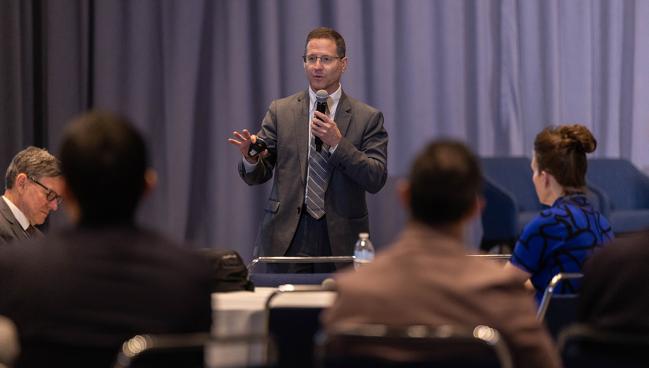Cardiologists Plot Next Moves After New Board Rejected
The ABCVM wanted to certify cardiologists outside of ABIM, but the recent denial doesn’t mean their efforts have stopped.

CHICAGO, IL—Though it did not win the endorsement of the American Board of Medical Specialties (ABMS) to take over certifying cardiologists, the American Board of Cardiovascular Medicine (ABCVM) is taking time to regroup and plan its next steps, leaders told attendees at a town hall session during the 2025 American College of Cardiology (ACC) Scientific Session.
Formed in 2023 as a result of discontentment within the cardiology community over the requirements for maintenance of certification (MOC) enforced by the current certifying body, the American Board of Internal Medicine (ABIM), the ABCVM represented a new paradigm. It had the support of the largest American cardiovascular societies—the ACC, the Heart Rhythm Society, the Heart Failure Society of America, the Society for Cardiovascular Angiography and Interventions, and the American Heart Association.
Even with that broad support, the ABMS rejected the ABCVM’s application in February to become its 25th independent board. The reasons for the denial included doubts about financial sustainability as well as disagreements over how often and on what basis cardiologists should be recertified, according to ABCVM leadership.
The ABMS said it would allow the new board to reapply after 24 months.
“We as the ABCVM with our partner societies will continue to explore the next steps,” said ABCVM chair Jeffrey Kuvin, MD (Northwell Health, Manhasset, NY) during the session. “We need to continue to communicate with the house of cardiology, our societies, and beyond to the house of medicine as to what alternatives we have and advocate for us as cardiologists, and we really want to hear from you . . . about where we should go.”
The ABMS received more than 1,400 comments regarding the creation of the new board, said Kuvin. This included about 1,000 from cardiologists that were “uniformly positive,” although there were criticisms from vascular surgeons who quibbled with the use of ‘cardiovascular’ in the board’s name.
With a show of hands at the town hall, most ACC attendees indicated they would like to find a different solution to certification outside of the ABMS.
Kuvin is not surprised. “I think we’ve heard for a long time that the present system isn’t working and under the ABMS, the ABIM has really been unable to satisfy the needs of the cardiologists,” he told TCTMD. “While we gave it a valiant effort, I think people are saying, okay, we’ve tried this way. Let’s think about an alternative path, which our board is thinking about.”
ACC executive vice-president Janice B. Sibley, MS, MA, agreed.
“We’ve been freed up a little bit to be a little bit more creative with what we might do in the future,” she told TCTMD. “We have lots of great ideas. We know that cardiologists are doing a lot, and I think now because we are not any more bound by what ABMS requires in terms of standards or rules, we might actually be able to pursue some options quicker than we had in the past.”
What those options might look like remains to be seen, but attendees at the town hall had many questions about how the rejection could have happened when the board seemed to take such careful steps to ensure it was doing everything correctly.
“I think all of us had felt almost like it was a fait accompli that this would go through and maybe it’s naivete and other political forces or other logistical challenges that really stymie something that seems so on point and important,” said Douglas Drachman, MD (Massachusetts General Hospital, Boston). As far as a future option outside of the ABMS, he wondered what that would look like given how the organization has long defined what it means to be a cardiologist: “Could there be the same validity of other routes to certification?” he asked.
Immediate past ACC president Cathleen Biga, MSN, RN (Cardiovascular Management of Illinois, Woodridge), suggested that hospitals and payers “may have to change bylaws to expand what that definition of certification really means.”
Kuvin admitted he doesn’t yet have answers, “but I can tell you people are already doing things. There are many people that are saying, ‘I don’t care. I’m leaving board certification to the side, and I’ll see if my administrator or my hospital says something about it.’ People are fed up and they want alternatives.” The National Board of Physicians and Surgeons (NBPAS), which was created in 2015, has already been providing an alternative route, he said.
Partnering with the ABMS would be the “easiest route,” Kuvin continued, “but we need a partner that’s going work with us, recognize that cardiology is distinct from [internal] medicine, and our ability to help support the profession.”
Why the Denial?
Looking more deeply at the reasons for the ABCVM’s rejection requires understanding how the new board would have differed from the status quo. With regard to the initial certification of cardiologists, the ABCVM isn’t pushing for big changes, but rather it wants to overhaul how cardiologists recertify, stressed Sibley.
“The major difference that we looked at was the idea that beyond just medical knowledge, you would be able to get credit for other things that you are doing on an everyday basis,” she said, including procedural skills, patient communication, and quality improvement initiatives. “All of those things should be counted as part of your whole professional outlook of what you are doing to maintain your competence.”
The new system proposed by ABCVM would stay on a 5-year cycle but would be supplemented by these other elements as opposed to a simple pass or fail test score.
Andrew Kates, MD (Washington University in St. Louis, MO), added that the ABCVM would eventually like to see some changes made to the initial certification process to include more of these skills as well, and not just a “high stakes knowledge-based exam.” However, the majority of the field’s complaints have been regarding MOC, so that’s the first hill to climb, he said.
Commenting during the discussion, Courtney Campbell, MD, PhD (Baylor, Scott & White, Dallas, TX), noted that medical certification has always had rigid requirements, but today, much of the face-to-face patient care is being done by advanced practice providers and physician assistants who don’t have to adhere to the same levels of recertification as physicians.
“We do our CMEs, we see our patients, we keep up, we respect that we are all adults, and we learn and we want to do best for our patients,” she said. “Why do we need so much handholding like we are fifth graders?”
Kathryn Berlacher, MD (University of Pittsburgh Medical Center, PA), pointed out that knowledge gaps in medical training have typically been associated with a “punitive response,” but maybe that’s not the best approach. “The other part of the concept of this board . . . is to reimagine how we respond to finding knowledge gaps,” she said. In other words, treating them as opportunities for growth and not reasons for reprimand.
Kuvin acknowledged the difficulty of assessing competence in this manner for more than 30,000 cardiologists and credits the ABMS with making some of the changes they already have to make the process better. “That’s why I think there’s a lot of disappointment on our side that we didn’t get the opportunity to show that we can do this, even as a pilot of cardiologists, doing a new way to assess competency,” he said.
Regarding the financial concerns that ABMS had about the ABCVM, Kuvin acknowledged that a start-up board funded by five societies with a loan “can’t compete with an existing board that has millions of dollars.”
Their analysis had shown that it could be a financially stable organization within several years, but that was assuming the ABCVM wouldn’t have to compete with the ABIM for cardiology certification. However, ABMS made no promises in this regard.
“There is no other paradigm for this in any of their 24 boards,” Kuvin said. “Secondly, this was unfair to the cardiologists. How would you choose, as a cardiologist, which to pick and who sets the standards for the house of cardiology? And I think it would provide tremendous confusion for patients.”
Future Directions
While he was hoping for the new board to be approved, Kates said several new working groups within the ACC are already developing strategic initiatives to continue to improve the process of recertification and education for cardiologists, including incorporating certificates for those who want to learn more about, say, sports cardiology or cardio-oncology.
Kuvin said they will continue to work with the ABIM to support the cardiology community, “but I think the goal here is for independence. Our first statement in our application is cardiology has evolved into its own specialty. It does not belittle what internal medicine provides, but clearly cardiology has evolved,” he said. “We need to make sure that we have an independent board to support that.”
“We will figure this out,” Biga concluded. “While we’re deeply disappointed with [ABMS’] response, I think we should be very proud of the fight and the collaboration that’s ensued because of this journey to look for a new board. . . . We’ve started a movement that’s important for our physicians to make sure that we have lifelong learning in an environment that truly helps them along with their CV care team. This is just the beginning of where we need to go.”
Yael L. Maxwell is Senior Medical Journalist for TCTMD and Section Editor of TCTMD's Fellows Forum. She served as the inaugural…
Read Full BioSources
Shifting the paradigm: update on the new cardiovascular board. Presented at: ACC 2025. March 29, 2025. Chicago, IL.






Comments